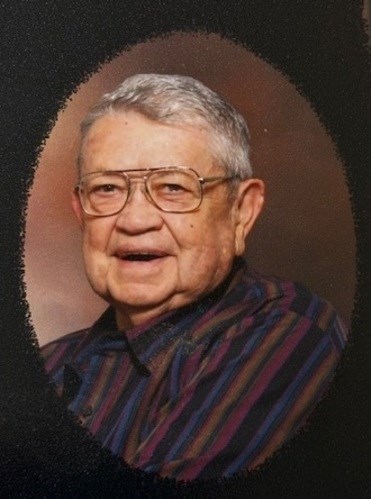A Legacy of Dedication: Wayne Earl Heathers
A Legacy of Dedication: Wayne Earl Heathers
Wayne Earl Heathers, born on October 19, 1934, in a Harlan County, Nebraska farmhouse, lived a life marked by dedication, integrity, and a deep commitment to his family, community, and the natural resources of his beloved Nebraska. He passed away peacefully on June 16, 2025, at the Wauneta Care Center, Wauneta, Nebraska, at the age of 90, leaving behind a profound and lasting impact.
Early Life and Service
Wayne's early years were shaped by the challenges of his time. With both of his older brothers serving in WWII, he grew up quickly, helping his parents in their wheat fields and independent oil and tire shop. A proud Huntley Bearcat, he graduated high school in 1952, even turning down a basketball scholarship to Kearney State, believing he wouldn't need a teaching certificate. Before long, the call to serve echoed again, and he volunteered for the U.S. Army, serving from November 1956 through November 1958. This period of service instilled in him a discipline and sense of duty that would define his future endeavors.
Building a Foundation in Conservation and Education
Upon returning from the military, Wayne embarked on a career path that would ultimately define his professional legacy. He began working for the Soil Conservation Service in Trenton, Nebraska, where he honed his expertise as a conservation aide, gaining invaluable practical knowledge in soil and water management. It was in Trenton that he met Loretta Baumfalk, his wife of 60 years, with whom he would raise two sons, Keith and Gene.
His commitment to education and agricultural stewardship became evident when the family moved to Curtis. From 1966 to 1972, he took a teaching position in Ag Land & Water at the University of Nebraska School of Technical Agriculture (UNSTA), later becoming a department head. This diverse background, blending hands-on conservation work with academic instruction, uniquely equipped him for the pivotal role he was soon to undertake.
Pioneering Leadership at the Middle Republican NRD
In 1972, Wayne Heathers became the inaugural manager of the Middle Republican Natural Resources District (NRD), a position he held with unwavering dedication until his retirement in 1999. His tenure coincided with a crucial period in Nebraska's conservation history, as the NRD system was established to consolidate over 150 special-purpose districts into a more streamlined and effective approach to natural resource protection and management.
The early days of the Middle Republican NRD under Heathers' leadership were fraught with challenges. The transition to the new NRD structure was met with resistance, even encountering court restraining orders. Despite these initial hurdles, Heathers steadfastly guided the district, focusing on critical conservation and watershed projects. This included navigating complex issues like securing land rights for vital watershed structures, such as those in the Medicine Creek and Blackwood Districts, essential for flood control and water management.
As the years progressed, the responsibilities of the Middle Republican NRD broadened considerably, mirroring the evolving understanding of environmental challenges. By the 1980s and early 1990s, a paramount concern emerged: groundwater management. Increased nitrate levels in the groundwater posed a significant threat, and under Heathers' forward-thinking leadership, the NRD was at the forefront of addressing this issue. He spearheaded the establishment of comprehensive well-monitoring programs, meticulously tracking groundwater levels and quality to better understand and mitigate contamination. This proactive approach underscored his commitment to long-term environmental health and cemented his reputation as a visionary in natural resource management.
A Man of Faith, Family, and Community
Beyond his professional achievements, Wayne was fundamentally a man of Faith, Family, and Community. He was a devoted husband and father, leading by example and always making time for his family, whether it was taking them fishing, playing catch in the yard, or helping with homework. His grandchildren were his pride and joy; he often attended their events, proudly sporting a Chase County Longhorn or McCook Bison cap to show his support. He was also blessed with two great-grandchildren, cherishing their visits.
Wayne's faith was central to his life, evident in his membership at the First Congregational Church and his enjoyment of Bible studies at the Care Center. His community involvement was extensive: he served on the school board, was a Rotarian, a 50-year Legion member, volunteered as an usher for the Easter Pageant, and assisted in teaching Hunter's Safety classes, dedicating countless hours to helping with baseball practice.
Known for his no-nonsense approach and dry sense of humor, Wayne was an accomplished public speaker, a skill that undoubtedly aided him in navigating public opinion and building consensus around the NRD's vital work. He found joy in simple pleasures like golf, trap and skeet shooting, bird hunting, and fishing at local lakes while listening to a Royals game. A loyal fan, he followed the Huskers every fall. His life was also a testament to his resilience, as he was a cancer survivor of 32 years, full of encouragement for others.
Lasting Impact
Wayne Heathers was preceded in death by his beloved wife, Loretta, his parents Ira and Cora, his brothers Marshall and Gerald and their wives Naomi and Della, and his brother Glen, who died at age 3 of polio.
He is survived by his sons, Keith (Joan) of McCook, and Gene (Tracy) of Champion; his grandchildren Schyler (Makala) Heathers of Imperial, Chantal (Andrew) Cecava of Lincoln, Shaylee Heathers (Jim) of Roca, NE, and Trae Heathers of McCook; his great-grandchildren Greyson and Gavin Cecava; and his brother-in-law Arnold Baumfalk of St. Helena, OR.
Wayne Heathers' legacy at the Middle Republican NRD is one of foundational leadership, steering the district through its formative years and establishing it as a crucial entity in protecting and managing Nebraska's precious natural resources. His life was a remarkable blend of professional foresight, personal integrity, and unwavering devotion, leaving an indelible mark on the region's environmental landscape and the hearts of those who knew him.
